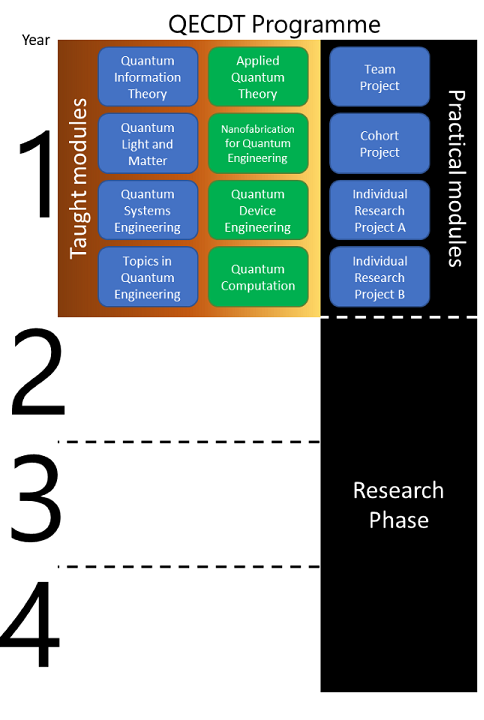The Quantum Engineering CDT is an EPSRC-sponsored programme based at the University of Bristol across the Faculties of Science and Engineering. We recruited our first cohort in 2014, and the programme was renewed in 2019. Our programme offers much more than a regular PhD; starting with a first exploratory year of theoretical and practical units, underpinned by a critical mass of experts from Bristol and beyond, with a strong component of soft-skills training through the 4-years, all enhanced by a cohort model that promotes early career collaborative research and networking.
Our programme was designed in collaboration with a large number of leading academic and industry experts. It encompasses both the theoretical understanding and the practical application of quantum physics, and offers a breadth of opportunities for discussion, engagement and peer-to-peer learning.
Programme details
Find details of our taught units here
Highlights include:
- Guided and self-inspired learning with a broad range of PhD research projects available
- Practical application as well as a sound theoretical understanding of quantum physics
- Complementary skills – such as commercialisation and science communication – necessary for academic and industrial excellence
- Access to an international network of world-class academic and industrial collaborators
- Industry trip to USA to visit companies and research labs working in the quantum field
- Financial support for academic and industrial secondments
- Opportunity and funding to attend international and national conferences
- A cohort approach to learning, enabling students to learn from each other in a rapidly evolving field
- Exclusive use of the CDT student office for your first year
- Student-led organisation of an annual conference
- Access to a broad technology base and state-of-the-art facilities.
- An annual Quantum Job fair for you to decide on the next stage of your career
More information about Year 1.

More information about Years 2 to 4.

It is the combination of the fundamentals of quantum physics and mathematics with engineering that makes this a truly successful approach to training.
Having a very basic knowledge quantum theory I was worried that I would behind my peers, however, I was taught everything I needed to know to work in the field and my practical engineering experience in many ways put me at an advantage when it came to starting the research phase of my PhD.